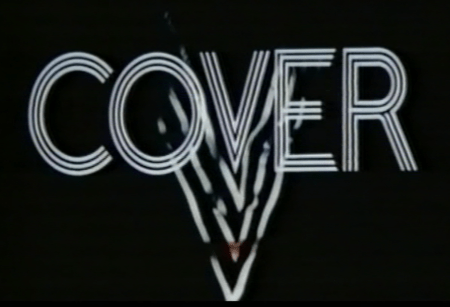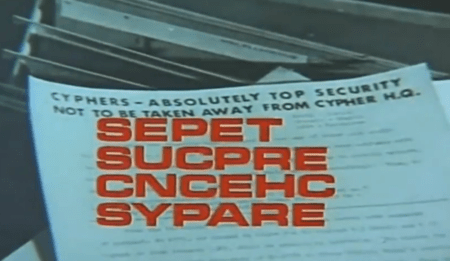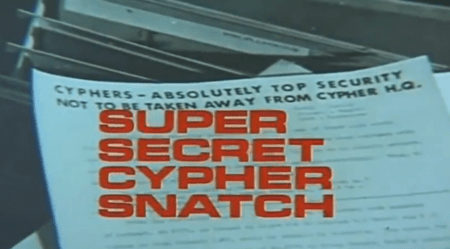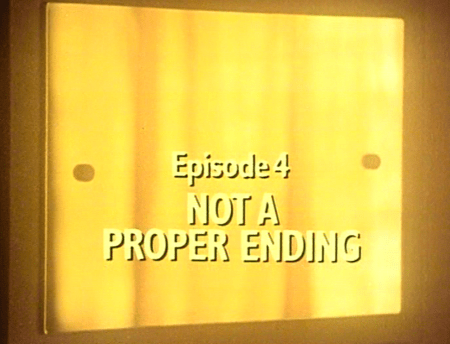‘Have you noticed how poetic and philosophic the titles of some of those tough American drama series are getting on TV? Tonight’s Sam Benedict (1962-1963) [i] story on London ITV at 8.0, for instance is called Green Room, Grey Morning. Last week it was Run Softly, Oh Softly. And before that Not Even the Gulls Shall Weep. Dr Kildare (1961-1966) appears tonight (BBC 8.0) in Love is a Sad Song. Last week: A Time to Every Purpose. The week before The Bed I’ve Made. And then there are Naked City (1958-1963) titles such as And By the Sweat of Thy Brow and Torment Him Much And Hold Him Long. What’s behind it all? An American TV executive in London told me yesterday: “The writers want to give their scripts a fancy title because it’s so hard these days to make stories stand out – especially in a series […] By giving their programmes titles like these, writers give the aura of respectability to a cops-and-robbers series.”’
That was Jack Bell’s piece Titles with taste in his Daily Mirror Telepage on 1 February 1963. As you may have guessed, it was my fascination with Naked City which led me to find the above article, and the appellations of the reports filed by the 65th precinct are a key element of the series’ enticing powers. C3H5(NO3)3, The Day the Island Almost Sank, The Corpse Ran Down Mulberry Street, Today the Man Who Kills Ants Is Coming… You want to know what these stories are all about.
Not just me as a viewer, but television professionals too. The writer Roger Marshall – who died recently – recalled to me in 2012 how he developed Public Eye (1965-1975) and his own approach to labelling Frank Marker’s investigations: “There was an American series on at the time called Naked City. I think we all thought, ‘That’s a good model, let’s go for those kinky titles that only become clear when you see the episode.’”
Thus Public Eye tended to take its titles from an oblique line of dialogue, the mysterious meaning of which meant you had to watch the programme – hence entries like I Went to Borrow a Pencil and Look What I Found, You Think It’ll Be Marvellous – But It’s Always a Rabbit, Honesty Is The Best Policy – But Who Can Afford the Premiums!, and It Must be The Architecture – Can’t be The Climate.
I bloody love episode titles like this. I got hooked on them back in the 1980s when I first started researching – trawling through newspapers and listings magazines to compile lists for series, typing them up as tables of data and becoming intrigued by the off-beat entries at a time when the title alone was possibly the closest I’d ever get to experiencing the programme.
I know that one cold afternoon in December 1991 I was tuned to BBC1 and I caught a repeat of an old episode of Hawaii Five-O (1968-1980) which was called … And They Painted Daisies On His Coffin. Now, I can’t remember who painted the daisies or whose coffin it was, or why… but I do recall the title.
Talking of coffins, I also remember switching to BBC2 one evening in February 1974 and experienced the black comedy delights of the long lost Perils of Pendragon (1974) purely because of the wonderful episode title: A Persistent Coffin.
And I’m not alone. After my rumination on alternate episode titles, I was contacted by journalist, filmmaker and YouTuber [ii] Benjamin Cook. “Brilliant stuff!” he says. “I’m a little bit obsessed with episode titles,” he says. “And your blog post reminded me of one of my favourite examples,” he says before brilliantly explaining to me how there are two episodes of Stewart Lee’s Comedy Vehicle (2009-2016) called Charity because in the first Stewart got side-tracked and ended up talking about crisps, meaning he was obliged to go back and do a second one where he was meant to stick to the subject.
Good to know that I’m not alone in my addiction. Maybe we could form a support group.
And when it comes to episode titles, let’s face it, we all know that it’s the weirder the better. Often it can totally compensate for the programmes themselves not quite living up to their promise.
Take Cover (1981), Philip Mackie’s sadly neglected off-kilter look at the world of espionage which spanned six glorious episodes… the titles of which formed the start of a nineteenth century nursery rhyme popularized by Beatrix Potter: Six Little Mice Sat Down to Spin, Pussy Passed By and She Peeped In, What Are You Doing My Little Men?, Weaving Coats for Gentlemen, Shall I Come In and Cut Off Your Threads? and No, No, Mistress Pussy, You’d Bite Off Our Heads.
And – believe me – that show does live up to expectations!
But, give me a format title and I’m also very happy, because we can see how they explore its use. Drawing from the original Erle Stanley Gardner novels, Perry Mason (1957-1966) became engaged in a weekly Case which across the years offered legal actions with adjectives and nouns presented as The Case of the Vagabond Vixen, The Case of the Perjured Parrot, The Case of the Slandered Submarine and concluding with The Case of the Final Fade-Out on CBS. Long term western fans may also recall how all those on the Wagon Train (1957-1965) tended to come with their own Story.
Over on NBC, The Man from UNCLE (1964-1968) and The Girl from UNCLE (1966-1967) were having their Affairs. They start with nice simple ones like The Vulcan Affair (concerning industrialist Andrew Vulcan) and The Shark Affair (about Captain Shark) but work up to items like The Very Important Zombie Affair and The Sort of Do-It-Yourself Dreadful Affair as the Sixties really start to swing. The same hokum set a century earlier formed The Wild Wild West (1965-1969) which offered a selection of Nights, starting with The Night of the Inferno and ending with The Night of the Tycoons but dropping in along the way on The Night of the Burning Diamond, The Night of the Surreal McCoy and the wonderful The Night of the Man-Eating House. Or you’ve got Amos Burke laying down Burke’s Law (1963-1965, 1994-1995) by asking Who Killed that week’s victim – be it Who Killed Mr X?, Who Killed Mother Goose? or Who Killed Nobody Somehow?
Back in the UK, the short-lived surrealism which formed The Corridor People (1966) identified its weekly Victims as per Victim as Birdwatcher through to Victim as Black. Strange Report (1969-1970) took it further with the structure REPORT [NNNN] [NOUN/VERB] ‘[Naked City style title]’ such as REPORT 4821 X-RAY ‘Who weeps for the doctor?’ and REPORT 7931 SNIPER ‘When is your cousin not?’.
Then there’s Orphan Black (2013-2017) taking its episode titles from Darwin’s On the Origin of the Species during its first year or the real-time action of 24 (2001-2010,2014) which naturally offered instalments such as 12.00am-1.00am, 1:00 am–2:00 am, etc. Or Mr Robot (2015-2019) who’s hip to tech-talk with computer filename titles like eps1.6_v1ew-s0urce.flv or eps2.9_pyth0n-pt1.p7z, a descendent of Bird of Prey (1982) which decades earlier tackled cybercrime with Input Classified, Mode Murder, Process Priority and Printout Urgent.
It’s a shame that – particularly with more recent series – that more of these wonderful monikers don’t actually appear on the shows themselves. Perish the thought that they should eat up vital seconds of screen time! But when they really add to the style and the fun of the thing, it’s terrific. I mean, who can resist tuning into an episode of The Avengers (1961-1969) and be presented with this…
… which, within seconds, flickers letter by letter and resolves itself as this…
A regular delight of Minder (1979-1994) was its spoof film titles which transposed big-screen classics to small-screen London lowlife, starting with Gunfight at the OK Launderette and continuing with the likes of The Beer Hunter, Senior Citizen Caine, High Drains Pilferer, The Car Lot Baggers and Guess Who’s Coming to Pinner?
Puns are smashing too – it’s a delight when a title promises one thing and the narrative then reveals an alternate meaning [iii]. Bridge Party from Naked City concerns workmen assembled to open a derelict swing bridge. The Frozen Swede from Mr Rose (1967-1968) revolves around the discovery of architect Darg Aklaksen who became trapped in the title character’s walk-in deep freeze. Rev Counter from Spyder’s Web (1972) sees the undercover Arachid Documentary Films team conducting surveillance into the gun-packing vicar whose parish magazine funds are financing a suburban guerrilla army dedicated to freeing the Isle of Wight from selective employment tax.
And don’t you love crazy, long irresistible titles that just fill the screen like With the French Heel Back, Can the Nehru Jacket Be Far Behind? from The Rockford Files (1974-1980, 1994=1999), Robin Hood and Clarence Darrow, They Went Out with The Bow and Arrow from Naked City or Look – (stop me if you’ve heard this one) But There Were These Two Fellers… courtesy of The Avengers.
![Fig 5: Just one of the eight million stories that I’m still enjoying [iv].](https://cstonline.net/wp-content/uploads/2020/05/TitleTattle_image05-450x299.png)
Fig 5: Just one of the eight million stories that I’m still enjoying [iv].
Then again, if people don’t remember titles anyway, why bother? Friends (1994-2004) had a smart approach in not really bothering with a title – I mean, pah!, who remembers those? – but opting for a description which would be the way in which somebody would describe a particular edition during an enthusiastic reminiscence, asking “Do you remember… The One Where the Monkey Gets Away or how about The One With All the Wedding Dresses or The One Where Rachel Smokes?”
And, as always, one can rely upon Spike Milligan to play with the concept of titles when it comes to The Goon Show (1952-1960) on radio. The script for ‘No 22. 8th Series’ is headed “_________________________”, and as the show starts, Spike himself explained to us that “in the faded writing we see that the title is …………….. Part I”, which is followed later in the show by “…………….. Part Two” and so on. When marketed abroad, the title was changed to ________! but, for the sake of sanity, tends to be known as World War One.
Possibly best of all is to discover that, although titled as it is entitled to be, one episode of the US version of Faking It (2014-2016) is still Untitled.
For those of you who have read all the way down this far in the hope of some sort of conclusion or proven hypothesis, I’ll end with the title assigned by Alan Plater [vi] to the concluding instalment of his serial Get Lost! (1981); this served as an advance warning to the viewers… and, as such, maybe should have gone at the start of this offering:
Andrew Pixley is a retired data developer. For the last 30 years he’s written about almost anything to do with television if people will pay him – and occasionally when they won’t. If this was a proper biography to a proper article, he’d also be desperately trying to impress you by telling you that he’s written for The Guardian and the TVTimes, but I don’t think we can count 20 multiple-choice questions on Doctor Who on a slow news day and a promotional piece about a theme night he’s worked on anyway proper bona fide writing credits, so if he did it would just end up leaving him looking needy and pathetic.
Footnotes
[i] Oh, by the way, these dates weren’t there originally because people knew what date it was when it was written. I just put them in for you now because I know how much you like having them.
[ii] Yes – that’s a thing. Get with the program!
[iv] My favourite of these long episode titles comes from the former radio show The Burkiss Way (1976-1980). Each episode was supposedly a ‘lesson’ in a correspondence course for life improvement – hence Lesson 1: Peel Bananas The Burkiss Way and Lesson 20: Discover Gravity The Burkiss Way, etc., leading all the way up to Lesson 45: Write extremely long titles with lots and lots of words in, like this, so that the Radio Times will have to allot more space than the measly half a centimetre of billing space we usually get and at least it’ll look a bit more prominent on the page, although still nowhere near the 50 column inches they give to The Hitch-Hiker’s Guide to the Galaxy The Burkiss Way.
[v] … a ‘wobble’ being period slang for a pedestrianism – competitive walking – which was a popular sport of the era.
[iv] … who adapted Peter Lovesey’s novel Wobble to Death for television. Alan was a master of episode titles. Check out the ones for his Beiderbecke trilogy (1985-1988) which give away nothing about the programme that is to follow by being the opening line of dialogue of the show – hence: What I Don’t Understand is This…, Um… I Know What You’re Thinking, That Was a Very Funny Evening and Hello Sir, Hello Miss.










Another great article from you, Andrew, and one that I can identify with. There are quite a few other TV series that have had episode titles akin to “Wagon Train”. “Rawhide” is a good example; most of the episode titles are a series of ‘incidents’ – ‘Incident of the Tumbleweed’, ‘Incident at Alabaster Plain’, ‘Incident with an Executioner’. The 1980’s detective series “Remington Steele” is another, with each episode having the titular character’s name in them in a punning way – ‘License to Steele’, ‘Steele Waters Run Deep’, ‘Thou Shalt Not Steele’.
Spare a though for fans of “The Muppet Show”. The episode titles here are just the names of the guest star – Episode 1: Juliet Prowse, Episode 2: Connie Stevens, Episode 3: Joel Grey. Exciting, huh?
Perhaps the one series that breaks the rules about episode titles is the short-lived “Police Squad!” Each episode has two titles – one that appears onscreen and a second completely different title spoken by the announcer – “A Substantial Gift (The Broken Promise)”, “Ring of Fear (A Dangerous Assignment)”.
Hi David 🙂
Bless you. This is a great site isn’t it? So much brilliant stuff. Of late, I’ve massively enjoyed John Ritchie’s lockdown viewing and Gary R Edgerton’s piece about what happened to cinemas during the 1918 pandemic was fascinating.
And such great examples of the ‘format’ approach – the US was streets ahead on this from what I can tell. There were so many others that I was tempted to cite for all manner of reasons: “Monk”, “Seeing Things”, “The West Wing”, “Probe” (1988), “The Troubleshooters”, “Strangers”, “Batman”… Even “Danger Patrol”.
Good to know that others love this element of television. 🙂
All the best
Andrew
Very enjoyable article yet again, Andrew! While it’s not strictly necessary for my enjoyment of a particular episode of a TV series, I do get an additional little kick when writers get creative enough to deliver a memorable title. You and David covered the bases very well. Might I just add a few more noteworthy examples from the U.S.?
When it comes to punning titles, L.A. LAW (1986-1994) might just reign supreme. From just season one alone, we get such classics as: “Those Lips, That Eye,” “Simian Chanted Evening,” “Raiders of the Lost Bark,” and “The Grace of Wrath.” Season two ups the ante: “Goldilocks and the Three Barristers,” “Full Marital Jacket,” “Beauty and Obese,” “Petticoat Injunction,” “The Bald Ones”…the list goes on and on.
ROUTE 66 (1960-1964), from the same writer/producer team who graced the world with NAKED CITY, continued the trend of poetic, at times obtuse episode titles, such as: “How Much a Pound Is Albatross?” “Shoulder the Sky, My Lad,” “There I Am -There I Always Am,” “From an Enchantress Fleeing,” “Narcissus on an Old Red Fire Engine,” etc. At times, even after watching the episode in question, I’m left scratching my head at how the title relates to the story. But better those kinds of esoteric titles than the strictly functional titles of many TV series…or worse yet, those series that don’t even bother with episode titles, resulting in them being listed on IMDB simply as “Episode 1.1.,” “1.2,” etc.
And count me among those who miss seeing the title displayed on screen after the opening credits, something that seemed ubiquitous in Prime Time when I was growing up in the ’70s and ’80s, but seems practically nonexistent these days.
Oh… bless you Jeff. That’s very kind! And what brilliant examples! Yes, I’d forgotten about “LA Law”; for some reason it was one which I only ever caught occasionally in the 1980s/1990s. And “Route 66” – yes, that’s one we need to see when we’ve done “Naked City” (we’re currently halfway through the final season and there’s some stunningly good scripts in there).
Nice to hear that there’s others out there who get all this stuff! 🙂
Much appreciated.
Andrew
PS: Now, you were asking about the whole ITC/ITP/ATV thing… and I’m currently getting a lot of research on which means that I’m un-learning a lot of what I’ve learnt since the 1980s. This week (and by next week I may have changed my mind), I suspect that ITC may have been set up to more effectively market “Lassie” repeats into syndication as “Jeff’s Collie” and that the first ITC production may have been the pilot for “The Adventures of Tom Swift”… but, as I say, I may have totally changed my mind by next week…
Gialli have the best titles. “Your Vice Is a Locked Room and Only I Have the Key” being my favourite alongside “So Sweet… So Perverse” (for added sleaze you have to say it slowly, with a raspy whisper and in the original Italian).